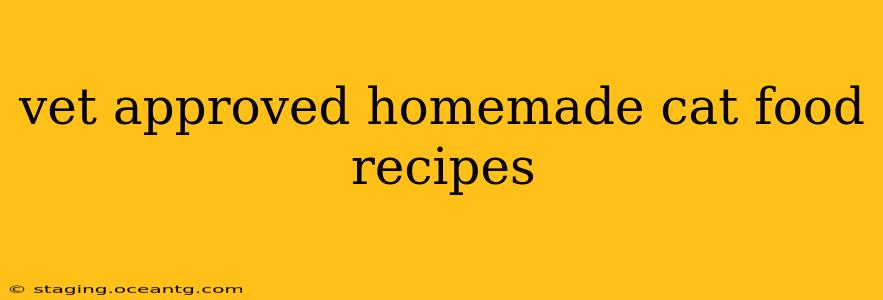Feeding your feline friend a balanced and nutritious diet is crucial for their health and well-being. While commercial cat food offers convenience, many cat owners are exploring the option of making homemade cat food. This comprehensive guide provides vet-approved homemade cat food recipes, focusing on nutritional completeness and safety. Remember, always consult your veterinarian before making significant changes to your cat's diet, especially if they have pre-existing health conditions. They can help you tailor a recipe to meet your cat's specific needs and ensure it's appropriate for their age, breed, and health status.
Understanding Nutritional Requirements for Cats
Cats are obligate carnivores, meaning their bodies are designed to thrive on a diet primarily composed of animal-based protein. A balanced homemade cat food recipe must include:
- High-Quality Protein: Chicken, turkey, beef, fish (tuna, salmon, mackerel – but avoid raw fish!), and eggs are excellent sources. Avoid pork and other meats that can harbor harmful bacteria.
- Essential Fats: Healthy fats are vital for skin and coat health. Sources include chicken fat, fish oil (rich in Omega-3 fatty acids), and small amounts of olive oil.
- Essential Nutrients: Cats need taurine (an amino acid), vitamin A, and arachidonic acid (an omega-6 fatty acid), which are often deficient in vegetarian or vegan diets. Supplementation may be necessary depending on the ingredients used. Your vet can guide you on appropriate supplementation.
- Fiber: A small amount of fiber aids digestion. You can incorporate small quantities of cooked pumpkin or sweet potato.
- Minerals: Calcium and phosphorus are crucial for bone health. You can incorporate these through bone meal (make sure it's formulated for cats, as dog bone meal often has higher phosphorus content) or by carefully balancing meat and organ meats in the recipe.
Avoid these ingredients:
- Onions and Garlic: These are toxic to cats.
- Grapes and Raisins: These can cause kidney failure in cats.
- Chocolate: Toxic to cats.
- Xylitol (artificial sweetener): Highly toxic to cats.
- Raw Meat/Eggs (unless specifically vet-recommended): Higher risk of bacterial contamination. Always prioritize food safety when handling raw ingredients.
Vet-Approved Homemade Cat Food Recipes (Consult your vet before implementing)
These recipes are examples and may need adjustments based on your cat's individual needs and preferences.
Recipe 1: Simple Chicken Recipe
Ingredients:
- 1 lb cooked chicken breast (boneless, skinless)
- 1/4 cup cooked brown rice
- 1 tbsp chicken fat (optional, for added fat)
- 1/4 cup cooked green beans (optional, fiber)
- 1 tsp taurine supplement (consult your vet on dosage)
Instructions:
- Finely chop or grind the chicken breast.
- Mix all ingredients thoroughly.
- Refrigerate any leftovers.
Recipe 2: Turkey and Sweet Potato Recipe
Ingredients:
- 1 lb cooked ground turkey
- 1/2 cup cooked sweet potato (mashed)
- 1/4 cup cooked carrots (mashed)
- 1 tbsp fish oil (rich in Omega-3s)
- 1/2 tsp calcium supplement (consult your vet on dosage)
Instructions:
- Mix all ingredients until well combined.
- Serve immediately or refrigerate for later.
Recipe 3: Salmon and Green Bean Recipe (Consult vet before including raw fish)
Ingredients:
- 1 lb cooked salmon (boneless, skinless)
- 1/2 cup cooked green beans
- 1/4 cup cooked peas
- 1 tbsp olive oil
- Vitamin A supplement (consult your vet on dosage)
Instructions:
- Flake the salmon and mix with the remaining ingredients.
- Serve chilled or at room temperature.
Frequently Asked Questions (FAQs)
How often should I feed my cat homemade food?
The frequency of feeding depends on your cat's age, activity level, and metabolism. Consult your veterinarian for a tailored feeding schedule. Generally, kittens need more frequent smaller meals than adult cats.
Can I add other vegetables to homemade cat food?
While some vegetables like green beans, carrots, and cooked sweet potato can be added in moderation, avoid excessive amounts. Cats primarily require animal-based nutrients.
What about commercial cat food supplements?
Some commercial cat food supplements are available to add to homemade meals. These often contain additional vitamins and minerals crucial to cat health. Consult with your veterinarian before incorporating any supplements to ensure you are providing the correct balance and avoiding potential overdoses.
My cat isn't eating the homemade food. What should I do?
Gradually transition your cat to homemade food by mixing it with their regular commercial food over several days. If your cat still refuses, consult your veterinarian to rule out any underlying medical issues.
How do I store homemade cat food?
Store homemade cat food in an airtight container in the refrigerator for up to 3-4 days. Avoid freezing large quantities, as this can affect the nutritional value of some ingredients.
Remember: This information is for educational purposes only and is not a substitute for professional veterinary advice. Always consult your veterinarian before making significant changes to your cat's diet. They can help you create a safe and nutritionally balanced homemade food plan that meets your cat's specific needs and ensures their health and happiness.
